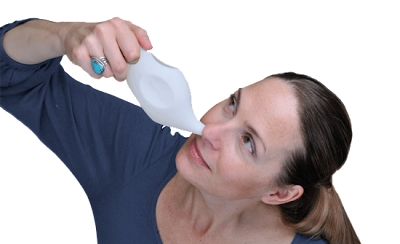Unfortunately, there is no medically proven cure for the common cold. However, there are a number of simple, all-natural steps that you can take to strengthen your immune system and minimize your likelihood of catching a cold this cold season:
1. Wash Your Hands – Most cold viruses are spread through direct contact with a sick person or an object recently handled by a sick person (doorknob, keyboard, etc.). Frequently washing your hands with anti-bacterial soap or hand sanitizer is a simple, effective way to protect yourself from cold and flu viruses.
2. Don't Cover Your Sneezes and Coughs With Your Hands - Germs and viruses cling to your bare hands, so use a tissue when you cough or sneeze. This will minimize the spread of germs.
3. Don't Touch Your Face - Cold and flu viruses enter your body through the eyes, nose, or mouth, so try to touch your face as little as possible.
4. Drink Plenty of Fluids - Drinking water flushes germs and toxins out of the body. A typical, healthy adult needs eight 8-ounce glasses of fluids each day.
5. Regular Aerobic Exercise - Aerobic exercise increases blood flow throughout the body, increases lung capacity, and raises bodily temperature – all of which increase the body's ability to fight off cold and flu viruses.
6. Don’t Smoke - Heavy smoking increases susceptibility to cold and flu viruses by drying out the nasal passages and damaging the delicate mucous membranes of the nose and lungs that protect the body from cold and flu germs.
7. Decrease Alcohol Consumption - Heavy alcohol consumption suppresses the immune system and dehydrates the body, increasing risk to infections.
8. Relax – Relaxation can help boost the immune system. According to WebMD, during periods of relaxation the number of interleukins (leaders in the immune system response against cold and flu viruses) in the blood stream increase. As a result, relaxation can help boost the immune system and fight cold and flu viruses.
Monday, January 12, 2009
Wednesday, January 7, 2009
Which Method Should I Use: Nasal Washing, Nasal Spray, or Nasal Mists?
There are a variety of ways to treat your nasal and sinus symptoms with saline. The most common methods are nasal washing, nasal sprays, and nasal mists. Each method is effective, but there are important differences that you should be aware of.
Nasal Washing
According to current medical research, nasal washing provides the most effective relief from sinus symptoms. Nasal washing treats the root of sinus problems by fully rinsing the sinus passageway, which moisturizes the nasal cavity and removes excess, thickened mucus that leads to congestion, drainage, headaches, cough and post nasal drip. Nasal washing removes irritants completely and more effectively than saline sprays and mists. In fact, a recent medical study conducted at the University of Michigan showed that nasal washing is significantly more effective than saline sprays and mists for adult sinus relief. Nasal washing helps relive symptoms caused sinus infections, the common cold, the flu, and allergies.

Saline Spray
Saline nasal sprays are also popular. According to WebMD, sprays help relive sinus symptoms by loosening mucous in the nasal passages and moisturizing the sinus dry nasal passages and sinuses. Unfortunately, saline spray does not rinse the sinus passageway as completely as nasal washing does, and is therefore not as effective. Saline sprays are often sold in pre-mixed spray canisters. As a result, the user has no control over the concentration of saline in the solution. Saline sprays also run the risk of re-contamination.
Saline Mists
Saline mists deliver a steady, comfortable mist that provides moisture to the nasal passages. The benefits of saline mists are similar to saline sprays. Saline mists moisturize dry nasal passages and sinuses, and may help loosen mucous. However, saline mists do not rinse the sinus passageway as completely as nasal washing does. Saline mists also run the risk of bacteria build up and re-contamination.
Nasal Washing

According to current medical research, nasal washing provides the most effective relief from sinus symptoms. Nasal washing treats the root of sinus problems by fully rinsing the sinus passageway, which moisturizes the nasal cavity and removes excess, thickened mucus that leads to congestion, drainage, headaches, cough and post nasal drip. Nasal washing removes irritants completely and more effectively than saline sprays and mists. In fact, a recent medical study conducted at the University of Michigan showed that nasal washing is significantly more effective than saline sprays and mists for adult sinus relief. Nasal washing helps relive symptoms caused sinus infections, the common cold, the flu, and allergies.

Saline Spray
Saline nasal sprays are also popular. According to WebMD, sprays help relive sinus symptoms by loosening mucous in the nasal passages and moisturizing the sinus dry nasal passages and sinuses. Unfortunately, saline spray does not rinse the sinus passageway as completely as nasal washing does, and is therefore not as effective. Saline sprays are often sold in pre-mixed spray canisters. As a result, the user has no control over the concentration of saline in the solution. Saline sprays also run the risk of re-contamination.
Saline Mists

Saline mists deliver a steady, comfortable mist that provides moisture to the nasal passages. The benefits of saline mists are similar to saline sprays. Saline mists moisturize dry nasal passages and sinuses, and may help loosen mucous. However, saline mists do not rinse the sinus passageway as completely as nasal washing does. Saline mists also run the risk of bacteria build up and re-contamination.
Subscribe to:
Comments (Atom)